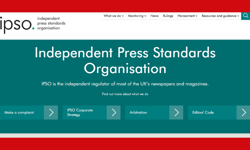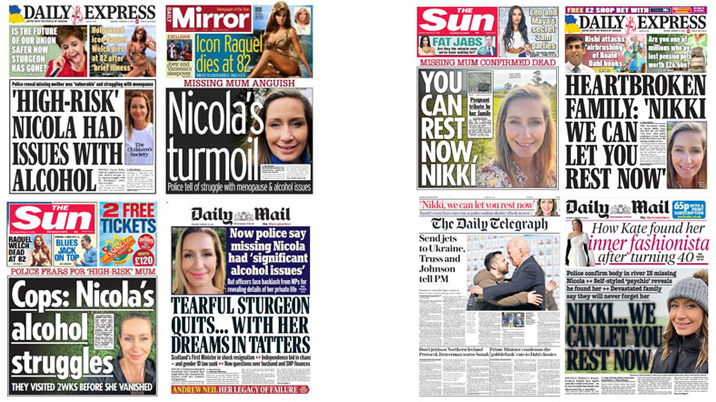
Nicola Bulley: was the Press above reproach?
“It saddens us to think that one day we will have to explain to them that the press and members of the public accused their dad of wrongdoing, misquoted and vilified friends and family. This is absolutely appalling, they have to be held accountable; this cannot happen to another family.
“We tried last night to take in what we had been told in the day, only to have Sky News and ITV making contact with us directly when we expressly asked for privacy. They again have taken it upon themselves to run stories about us to sell papers and increase their own profiles. It is shameful they have acted in this way. Leave us alone now.
“Do the press and other media channels and so-called professionals not know when to stop? These are our lives and our children's lives.”
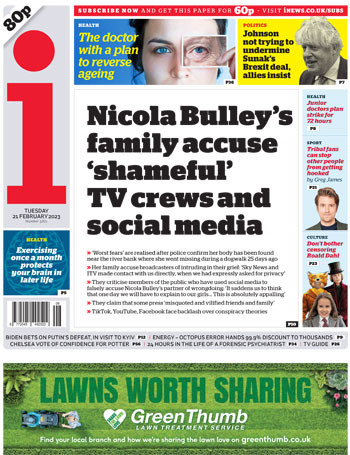
It was, as the Mirror’s Kevin Maguire tweeted on Monday, quite a statement. The family of Nicola Bulley venting their anger at the media after confirmation that a body found in the river Wyre was that of the woman who had been missing for the best part of a month.
The case had certainly created an unprecedented circus: hordes of people travelling hundreds of miles to play amateur detective, poking around in barns and caravans, marching across people’s land, all the while filming and commenting on TikTok. One report said that 40,000 people had logged on to one forum to “discuss developments and share theories”. Can you believe that? No wonder the family were ragged.
But was it reasonable for them to include the Press in their criticism? The outlets they specifically named were broadcasters; the TikTok vigilantes had nothing to do with the newspapers. Who expects Paul Ansell and his friends and relatives to be reasonable in the circumstances, to concern themselves with semantics? The Press may have been comparatively restrained – not hard when the comparator is an army of deranged and deluded conspiracy theorists – but it was far from perfect.
Some papers have taken delight in attacking the police (who, it must be said, appear to have called it right all along, even if the search took longer than most would have wished) and, of course, those nasty unregulated online rivals. But they weren’t so confident in their self-righteousness to publish those criticisms. If they were immediately answerable – “we didn’t accuse Mr Ansell, we didn’t vilify the friends and relatives” – why be so shy of printing the charge?
By any measure, the complaints about the media were the core of that statement. Of course the family love, miss and won’t forget Ms Bulley. Of course they want her to rest in peace. Of course they wanted to thank those who have supported them. The “news” element was the exasperation and suppressed anger in the way they had been treated. Look at the words: “shameful”, “appalling”, “don’t they know when to stop?”, “These are our lives and our children’s lives.”
Three little words

Yet, look at the front pages on Tuesday and they almost all had versions of the same headline: “You can rest now Nikki”. Only the i and the Guardian grasped that the attack on the media was the key line – and the i still edited out “to sell papers”, focusing instead on television and social media. It wasn’t a long statement (though obviously longer than the three pars above), the odd three words wouldn’t have made a lot of difference. And if you had to cut three words for reasons of space, couldn’t three other words have been found? No, it was an editorial judgment not to share the words. Funnily enough, the Sun and Mirror also found itself short of the space for exactly those self-same words (as did the Mail, although it had a rethink and put them back in). This is troubling.
In the normal course of events, if someone says something in a public forum that you think is erroneous – think Donald Trump, for example – do you go ahead and publish anyway without explanation or repudiation, do you ignore, or do you publish and then put in context? I would argue that, depending on how important or ludicrous the original statement is, the choice is between the second and third options.
But when you have a vested interest or you are the one under attack, then the rules change and the choice has to be between options 1 and 3. To ignore in these circumstances damages your reputation more than the assault on it from outside. If you are found willing to conceal something inconvenient to yourself, it brings into question your reliability on every issue, rather than just the one for which you are being criticised.
Why can papers not see this? If Kevin Maguire was sufficiently moved by watching the video of the statement being read out, why couldn’t the paper of which he is associate editor recognise its power? Why did it sanitise those three explosive paragraphs into, “They also criticised certain media outlets over coverage of the case” – not mentioning Sky or ITN, let alone the Press?
The Sun also said the family had been critical of “some members of the public and media outlets” and turned the specific allegation against the broadcasters into “made claims that…”
The Mail, by contrast, ran the quote about vilification in an inside story headlined “Relatives’ broadside against sections of the media” and then followed it with the sentence “There have been no accusations made against Mr Ansell in the Press, but social media has been awash with hurtful speculation.” Fair enough.
Not fair at all, however, was this distortion of another part of the statement in the splash: “The family also addressed the upset caused by the intrusion they had suffered after Lancashire Constabulary lost control of the case. Despite detectives believing Ms Bulley had fallen in the river due to her 'specific vulnerabilities', they allowed a vacuum of information to open that led to cruel online sleuths suggesting Mr Ansell or other friends and family could be involved in some sort of criminal act.
“Addressing the upset caused by this, Ms Bulley's family said they would one day 'have to explain' to her daughters how her friends and relatives were 'vilified'. 'This is absolutely appalling, they have to be held accountable, this cannot happen to another family,' they said.”
The family statement said nothing about the police “losing control” of the case, about a “vacuum of information” or about these assertions-cum-facts causing the intrusion and vilification that upset them. The construction of these two paragraphs leaves the reader with the impression that it was the police whose behaviour had been absolutely appalling and they who should be held accountable. This was a barefaced deflection of criticism aimed at itself (however justified or otherwise) on to the people it had been treating as whipping boys for weeks.
The Press didn’t, IMHO, do a terrible job in general on the Bulley case. But we can all always do better. A bit of self-reflection when someone pulls you up never hurts; it’s certainly far more productive than blocking your ears and singing “la, la, la” at the top of your voice.
Too much information?

One area of the case where the papers absolutely didn’t cover themselves in glory was the police disclosure, late in the hunt, that Ms Bulley had “alcohol issues” related to the menopause. This brought cries of victim-blaming and sexism and the question, “why now?”
The police said they needed to clarify their earlier comments about “vulnerabilities” to stop internet speculation, others suggested someone was trying to sell the story to the Press. We know that the family was aware of what was planned before that press conference; maybe there was a desire to control the message.
Maybe the police wanted to counter implicit and explicit charges of complacency – there was heavy pressure from both mainstream and social media for them to consider the possibility of a crime, that Ms Bulley had been abducted and might still be rescuable – with what they saw as an explanation of why they were sticking to their working hypothesis. (Despite the negative press they were receiving, they were still following up any other credible avenues.)
Whatever the reason for that decision to release the information, it didn’t go down well and over the hours after that press conference, the chorus of disapproval grew, with ministers and MPs from all parties adding their voices to the choir.
Now let me take you on a little diversion. Imagine for a moment that the National Trust had announced one lunchtime that it planned to turn the garden of one of its properties into a theme park. And imagine that over the course of that afternoon, a succession of members threatened to cancel their subscriptions and the culture secretary had announced that they would do all they could to veto the plan. What would be the headline the next day? The NT proposal or the ministerially-backed campaign to stop it? Probably a mix of the two, but if a choice had to be made, almost certainly the campaign.

Sometimes the reaction comes so hot on the heels of the original story that it becomes the more compelling angle. Sometimes – if the idea is sufficiently counter to the paper’s way of thinking – the reaction doesn’t even have to be that compelling. Think of all those “Outrage at” and “Fury at” headlines in the whitetops, built on stories where three backbench MPs are cross about something or when Harry and Meghan have stepped out of line again.
(And here’s a little treat that I had to share – while researching the cuttings above, I came across a real story about an NT plan that was framed as a “fury” reaction story.)

So there are plenty of precedents for the “day two” line to take centre stage on “day one”.
Yet when it came to Nicola Bulley and her menopause, even with all the outcry about the information being put in the public domain – including from journalists on the very papers that would print the story – almost every title focused on her “alcohol issues”. The Sun, Mirror and Express all splashed on them, the Mail made the disclosure a big blue puff (albeit with the backlash as the subhead). And this on the day of Nicola Sturgeon’s surprise resignation, which was certainly a “moment”.
Let’s just pause and think about that again. We don’t think you should have told us this. We don’t think it is helpful. We think it is intrusive and sexist. We don’t think it’s relevant to the search. But we’re going to make it our main story. And then we’ll have a pop at you for telling us in the first place – or, in some cases, for not telling us earlier. As though that would have made all the difference.
Where is the logic in that? Where is the sanity? Oh, it’s what readers are interested in. It’s out there. Everyone else will do it. And then after we’ve done it, we’ll have fodder for our columnists, who will be able to write about how it should never have been put out there. It’s like the “friends” who tell you what “other” nasty people are saying about you: “It’s not me saying this, but I thought you’d want to know.”
Heaven help us! It is to be hoped that if someone were trying to tout the story around Fleet Street that they would have been rebuffed. But looking at that coverage last week, I can’t be too confident; we can see how “Nikki’s anguish” would have played out. It would all have been so sympathetic. The police not only potentially saved one title £30k by giving out the goodies to everyone for nothing, but they also gave us all a classic example of journalistic cakeism: no one had to pay, they all got to tell the story, and then they got to shoot the messenger as well. Trebles all round.
Disrespectful
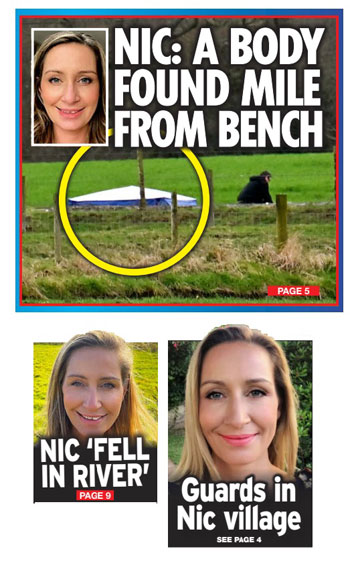
Being long in the tooth and old-fashioned, I have become more intolerant of the way papers play fast and loose with people’s names. Way back in the day, “Maggie” was a term both of endearment and disdain in the way that “Boris” has never been. She was a creature apart, none of her contemporaries were known by their first name. John Major was never “John”, Blair only rarely “Tony”, Cameron “Dave” only as a mark of contempt.
Now this familiarity is everywhere: Priti, Rishi, Suella. It’s not healthy. Meanwhile, celebs all have their names shortened to three letters ending in either “z” or “x”.
I know it’s helpful for the tabs where space is tight, but there are limits. Nicola Bulley was apparently known to her nearest and dearest as Nikki. I liked the fact that most papers, for the most part, resisted the temptation to feign intimacy with a woman they would never know and stuck with “Nicola”. But I absolutely hated it when, for sake of a bit of imagination, it was reduced to “Nic”, a name by which there is no evidence that she was ever known. It struck me as casual and disrespectful, a further commodification of a woman whose personal tragedy was an instrument of profit for too many.
TikTok: everyone’s on it

Talking of profit, the Press has enjoyed looking down its noses at the TikTok upstarts and their despicable antics. But the MSM haven’t been above trying to use the case to turn a buck, with Newsquest the most blatant, telling journalists to link from Bulley stories to drive traffic to its true-crime YouTube channel.
In researching for this Notebook, I looked at TikTok and searched for #nicolabulley. There had been 400m views. Blimey. A screen full of videos was offered and to my surprise (showing my ignorance), 13 of the first 24 were from MSM brands – with the Daily Mail accounting for seven. Headlines included “BOMBSHELL Facts and myths on Nicola Bulley” and “Friend shares ELEVEN facts about Nicola’s disappearance”. Scrolling further down, I counted three each from Sky and ITV, two each from the BBC and LBC and one apiece from Victoria Derbyshire and the Sun.
All of which were doubtless there to offer a service to the public and not at all to make money, sell papers or raise their profiles.
Finally, finally. You’ve probably seen this, but it cannot be overlooked. There are sad juxtapositions, bad juxtapositions and what-the-hell-is-going-on-is-nobody-looking-or-thinking juxtapositions. This is plain unforgiveable:
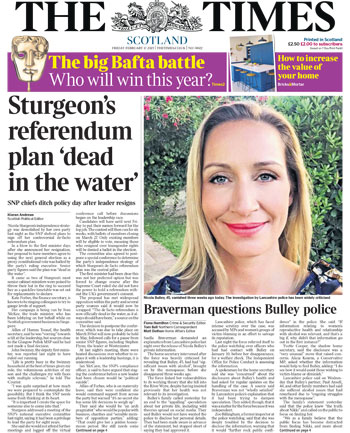
Underwhelming (south of the border) coverage of Nicola Sturgeon’s resignation

The Times didn’t have a happy time of it with Nicola Sturgeon’s departure. The blunder above was the Scottish edition on day two, but the English edition on the day she quit was almost as uncomfortable. In fact, the whole front page was a disaster – we’ll look at it presently.
The Marmite simile may be tired, but with Ms Sturgeon, it is apposite. For many, she was the most effective British politician of the past two decades – indeed for a while, we down South looked enviously across the border where they had the luxury of Sturgeon and Ruth Davidson oozing competence while we had May and Corbyn. For others she was anathema. The Mail once described her as the most dangerous woman in Britain (that week) and it was damning when she announced she was standing down. Her dreams, it says, were in tatters.
Whether her departure harms or helps the independence cause we shall learn soon enough, but there is little doubt the loss of such a dominant (if divisive) figure will have ramifications, not only in Scotland but in Westminster. It may, according to those who know much more than I, help the Labour party to regain some of the ground it has lost during her tenure – which would obviously have an impact on its chances of forming a government without requiring the support of other parties.
The big questions are whether it was she, her cause, or both that had run out of steam. Will the campaign be reinvigorated by a new leader, as she claimed in her elegant resignation address, or has she swerved presiding over its demise?
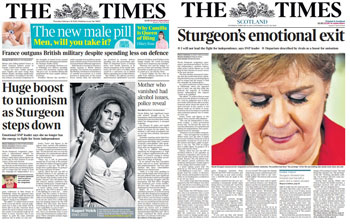
Which takes me back to the Times. If you are of the opinion that there is no majority or appetite for Scottish independence, does it matter who is in charge of the campaign to achieve it? (Similarly, if you are of that belief – as successive UK prime ministers have said they are – what is there to be feared in putting that to the test in a new referendum? But that’s a side issue.)
Maybe the Times has taken heed of the result of the Brexit poll and concluded that, yes, a charismatic champion can win against all expectations. And maybe, for that reason, it is glad to see her go (as rival politicians reportedly are). But, even taking all that into account, I really felt that this headline missed the mark. In fact, it was sub-Daily Express, with a “Ding dong, the witch is dead” celebratory tone that jarred.
And was that it? A double column splash with a pin-up pic of Raquel Welch, the usual puffs and a couple of other stories (one of them being that controversial press conference about Nicola Bulley’s vulnerability). It was almost as though the paper wanted to snub its nose at Sturgeon by pretending that she didn’t matter – while at the same time running a headline that suggested she most certainly did.
The day that the most electorally successful politician on these islands suddenly steps down with style, humour and panache is not the day for a Times Template 1A layout with a parochial, partisan headline; it’s a time for a bit of gravitas and graciousness. In this – if spectacularly not so the next day – the Scottish team got it right (even if the page did look a bit stodgy and there were better pictures to be had).
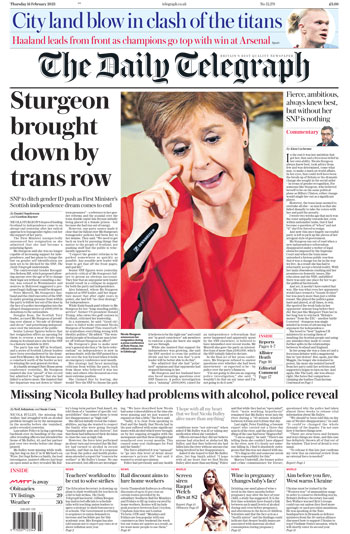
Meanwhile, the Telegraph ran an almost-as-uninspired splash head, putting it all down to the trans row. That’s what many of us who don’t know much about Scotland did for the first five minutes until a host of experts explained it all to us in words of one syllable. But you kind of expect national newspapers to be ahead of you. But at least it gave over half its front to the story, plus a couple of spreads inside.
And here, by way of a change, are some of the Scottish papers from that day. I thought the Herald layout was intriguing and quite arresting:
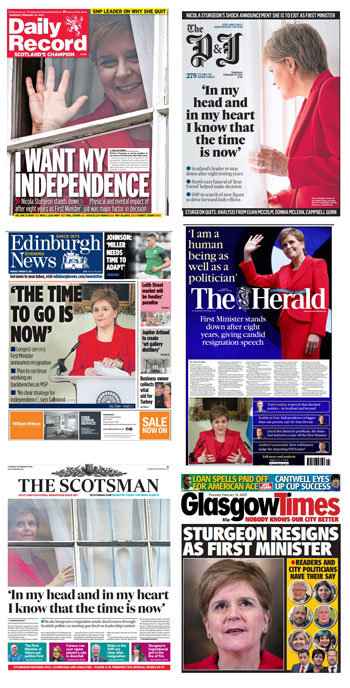
The Times campaigns for clean waterways
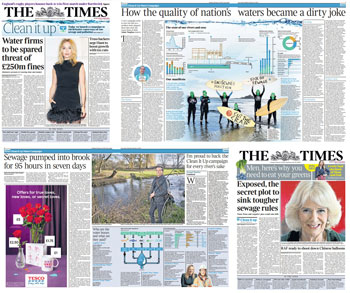
Maybe Times executives’ minds were on other things when Sturgeon resigned, because her departure interrupted the flow (no pun intended) of its new campaign to clean up our waterways. This, after its exposé of British Gas agents breaking into houses to install prepayment meters, was another welcome spotlight on how privatised utilities are behaving. Not that the paper is suggesting renationalisation of either.
This was a textbook example of how to launch a campaign: a splash, a couple of spreads, a supportive “name”, and a leading article, followed up by more of the same over several days. You then hope readers will take up the cudgels in the letters page. Which they duly did.
The state of our rivers and seas is a scandal and it is only surprising that other papers – I’m obviously thinking here of the Guardian – haven’t already campaigned forcefully (beyond assiduous reporting of live stories) for “something to be done”. But whoever fights the cause is to be applauded.
Naturally, different people have different ideas on how to go about tackling the problem. The current environment secretary, Thérèse Coffey, is apparently not enamoured of her predecessor’s plans for £250m fines for pouring sewage into the rivers, saying that the prospect of such huge penalties (even though nothing anything like that figure has ever been imposed) would deter investment in the water infrastructure.
[Is there a pattern here? Ms Coffey was, briefly, Liz Truss’s deputy prime minister in an administration that set about cutting taxes to avoid deterring investors. Now she wants lower fines to the same end.]
Anyway, she’s reportedly backing away from the big stick – hence the Times splash “Water firms to be spared threat of £250m fines”, a form of words that sounds almost as though the paper is on their side rather than campaigning to have them shape up. In fact, the paper wants the Environment Agency to have tougher powers and for polluting water bosses to face the risk of both fines and jail.

The “name” endorsing this campaign is Feargal Sharkey, described as “the water equality activist”, who writes a piece on the second spread. A few days later, there is a story about a victory for Southern Water customers who have been withholding part payment of their bills in protest at the company’s sewage spills. They had been egged on in their action by Bob Geldof. There is joy in the thought of the staid old Thunderer, pillar of the establishment and all that, turning to a pair of old punk era rockers to put the world to rights.
Even so, I am perplexed. These campaigns don’t just emerge from thin air; they require planning and co-ordination that usually takes weeks. On January 24, Rhys Blakely wrote a news story (which quoted Sharkey) about “temporary” permits governing sewage overflow that had been in place for ten years or more. The next day, MPs voted to overturn a Lords amendment that would have forced water companies to act more quickly to cut pollution, agreeing instead to set a target of an 80% reduction in phosphates by 2038 – in other words to allow the dumping of raw sewage to continue for another 15 years. The Times didn’t even report the vote. Strange.
Front page of the fortnight
As seen above, some of the Scottish fronts for Sturgeon’s farewell were striking. This was my favourite – but with one caveat. The National’s photograph was taken at her party conference nearly five years ago. A file picture on such a day?
As we have seen from above, and as all its readers will have known, she made her departure in a bright red outfit.
The Herald, too, used an old picture in its quest to have her waving goodbye, but at least she was wearing a red suit. Does that make it more of a cheat? Probably. Such a shame.
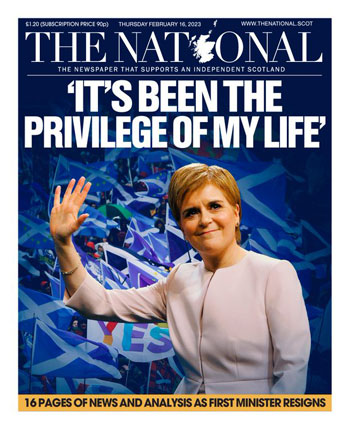
Liz Gerard’s Notebook is a fortnightly column published in the InPubWeekly newsletter. To be added to the mailing list, enter your email address here.





